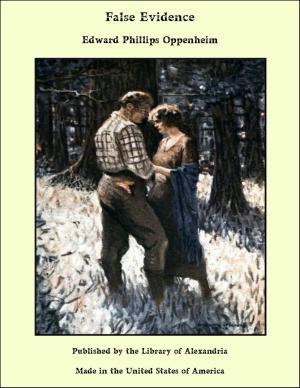| Author: | John Bloundelle-Burton | ISBN: | 9781465609328 |
| Publisher: | Library of Alexandria | Publication: | March 8, 2015 |
| Imprint: | Language: | English |
| Author: | John Bloundelle-Burton |
| ISBN: | 9781465609328 |
| Publisher: | Library of Alexandria |
| Publication: | March 8, 2015 |
| Imprint: | |
| Language: | English |
Wrapped in his cloak, and prevented from falling by his bridle arm, he bore a little child—a girl some three years old—on whom, as the cloak would sometimes become disarranged, he would look down fondly, his firm, grave features relaxing into a sad smile as the blue eyes of the little creature gazed upward and smiled into his own face. Then he would whisper a word of love to it, press it closer to his great breast, and again ride on. For three days the snow had fallen; was falling when he left the garrison of Pontarlier and threaded his way through the pine woods on the Jura slopes; fell still as, with the wintry night close at hand, he approached the city of Dijon. Yet, except to sleep at nights, to rest himself, the child, and the horse, he had gone on and on unstopping, or only stopping to shoot once a wolf that, maddened with hunger, had sprung out at him and endeavoured to leap to his saddle; and once to cut down two footpads—perhaps poor wretches, also maddened with hunger—who had striven to stop his way. On and on and on through the unceasing snow he had gone with the child still held fast to his bosom, resting the first night at Poligny, since the snow was so heavy on the ground that his horse could go no further, and another at Dôle for the same reason, until now he drew near to Dijon. "A short distance to travel in three days," he muttered to himself, as, afar off, his eye caught the gleam of a great beacon flaring surlily through the snow-laden air—the beacon on the southern watchtower of the city walls—"a short distance. Yet I have done my best. Have obeyed orders. Now let me see for further instructions." There was still sufficient light left in the wintry gloom to read by, whereon, shifting the child a little as he drew rein—it needed not much drawing, since the good horse beneath him could hardly progress beyond the slowest walk, owing to the accumulated snow—he took from his holster a letter, and, passing over the beginning of it, turned to the last leaf and read: "At Dijon you will stay at the château of my good friend and subject the Marquis Phélypeaux, avoiding all inns; at Troyes, at the manoir of Madame la Marquise de Roquemaure; at Melun, if you have to halt there, at the château of Monsieur de Riverac. Between these, if forced to rest, you are to select the auberges which offer; but at these three towns you are to repose yourself as stated. Above all, fail not to present yourself at the manoir of Roquemaure. The marquise will deliver to your keeping a message for me. Therefore, be sure you travel by the route indicated, and not by that which passes by Sémur, Tonnerre, and Sens. On this, I pray God to have you, M. Georges St. Georges, in his holy keeping. Written at Paris, the 9th of December, 1687.
Wrapped in his cloak, and prevented from falling by his bridle arm, he bore a little child—a girl some three years old—on whom, as the cloak would sometimes become disarranged, he would look down fondly, his firm, grave features relaxing into a sad smile as the blue eyes of the little creature gazed upward and smiled into his own face. Then he would whisper a word of love to it, press it closer to his great breast, and again ride on. For three days the snow had fallen; was falling when he left the garrison of Pontarlier and threaded his way through the pine woods on the Jura slopes; fell still as, with the wintry night close at hand, he approached the city of Dijon. Yet, except to sleep at nights, to rest himself, the child, and the horse, he had gone on and on unstopping, or only stopping to shoot once a wolf that, maddened with hunger, had sprung out at him and endeavoured to leap to his saddle; and once to cut down two footpads—perhaps poor wretches, also maddened with hunger—who had striven to stop his way. On and on and on through the unceasing snow he had gone with the child still held fast to his bosom, resting the first night at Poligny, since the snow was so heavy on the ground that his horse could go no further, and another at Dôle for the same reason, until now he drew near to Dijon. "A short distance to travel in three days," he muttered to himself, as, afar off, his eye caught the gleam of a great beacon flaring surlily through the snow-laden air—the beacon on the southern watchtower of the city walls—"a short distance. Yet I have done my best. Have obeyed orders. Now let me see for further instructions." There was still sufficient light left in the wintry gloom to read by, whereon, shifting the child a little as he drew rein—it needed not much drawing, since the good horse beneath him could hardly progress beyond the slowest walk, owing to the accumulated snow—he took from his holster a letter, and, passing over the beginning of it, turned to the last leaf and read: "At Dijon you will stay at the château of my good friend and subject the Marquis Phélypeaux, avoiding all inns; at Troyes, at the manoir of Madame la Marquise de Roquemaure; at Melun, if you have to halt there, at the château of Monsieur de Riverac. Between these, if forced to rest, you are to select the auberges which offer; but at these three towns you are to repose yourself as stated. Above all, fail not to present yourself at the manoir of Roquemaure. The marquise will deliver to your keeping a message for me. Therefore, be sure you travel by the route indicated, and not by that which passes by Sémur, Tonnerre, and Sens. On this, I pray God to have you, M. Georges St. Georges, in his holy keeping. Written at Paris, the 9th of December, 1687.















